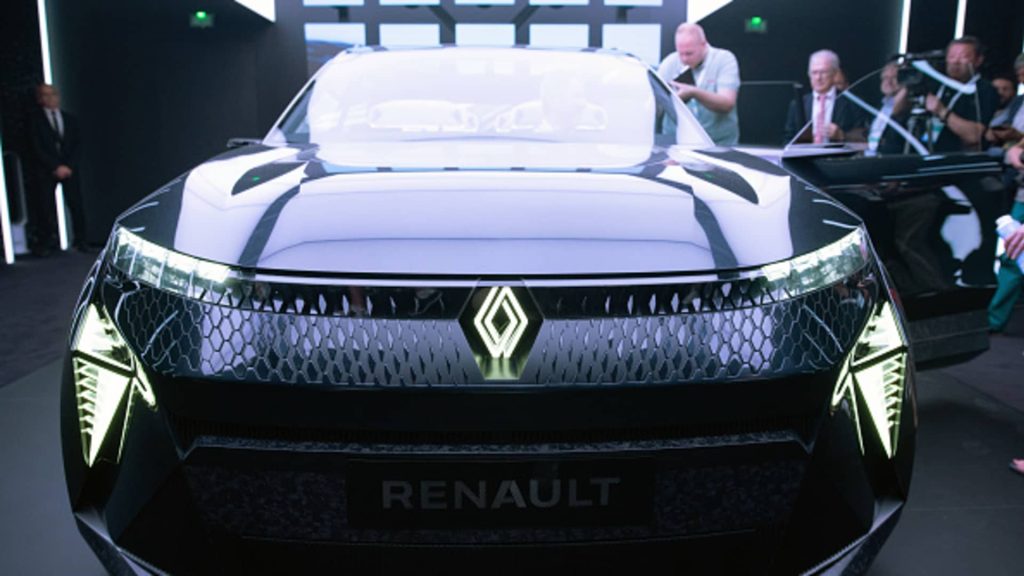Details of the Renault Scénic Vision concept car were presented to the public on May 19, 2022. The company’s idea of developing a passenger car using hydrogen technology is not unique.
Benjamin Gerrett | Bloomberg | Getty Images
Renault It released details of a hydrogen-electric hybrid concept car, with the French carmaker calling hydrogen technology “one of the options to make electric vehicles more convenient”.
The design of the Renault Scenic Vision includes a hydrogen engine, electric motor, battery, fuel cell and hydrogen tank. Renault said the 2.5-kilogram tank is located in the front of the car and will take about five minutes to fill.
According to a document published Thursday that outlined the concept, the Scenic Vision’s 40 kWh battery is recyclable and will be produced at a facility in France by 2024.
In a statement, Gilles Vidal, Renault’s design director, said the concept “embodies the exterior design of the new 100% electric Scénic for 2024”. The company said the electric and hydrogen powertrains are “part of a long-term vision beyond 2030”.
The general idea is that the hydrogen fuel cell in the Scenic Vision will help expand the car’s range during long trips. “In 2030 and beyond, once the network of hydrogen stations is large enough, you will be able to drive up to 800 km. [a little over 497 miles] Renault said … without stopping to charge the battery.
Described by the International Energy Agency as a “versatile energy carrier,” hydrogen has a variety of applications and can be deployed in a wide range of industries.
It can be produced in several ways. One method involves the use of electrolysis, with an electric current that splits water into oxygen and hydrogen.
If the electricity used in this process comes from a renewable source such as wind or solar energy, some call it green or renewable hydrogen.
It is envisaged that the Renault Hybrid will use green hydrogen, although the vast majority of hydrogen generation is currently based on fossil fuels.
Renault’s hydrogen electric concept shows how car companies are looking for ways to develop low- and zero-emissions offerings that can rival the range of petrol and diesel cars.
“Several systems are being explored to complement electric motors today to meet the requirements associated with long-distance driving,” Renault said. “Hydrogen technology is one option to make electric cars more convenient.”
In the field of hydrogen transportation, the Renault group has already established a joint venture with Plug Power called Hyvia. Among other things, it focuses on hydrogen fuel cells in light commercial vehicles and rolls out hydrogen charging facilities.
Renault’s idea of developing a passenger car using hydrogen technology is not unique.
ToyotaFor example, work on developing fuel cell vehicles – where hydrogen from a tank mixes with oxygen, producing electricity – began in 1992. In 2014, the Japanese company launched Mirai, a hydrogen fuel cell sedan.
Other big companies like hyundai And BMW them too Consider hydrogenas well as smaller concerns Like UK-based Riversimple.
While the aforementioned companies are researching hydrogen’s potential, some of the leading figures in the automotive sector aren’t entirely sure. In February 2021, Herbert Diess, CEO of Germany Volkswagen Groupweighed in the subject. “It’s time for politicians to accept the flag,” he wrote on Twitter.
“Green hydrogen is essential for steel, chemicals, and air…and it doesn’t have to end up in cars. Expensive, inefficient, slow, and difficult to move and transport. After all: there are no hydrogen cars in sight.”
Although the Scenic Vision concept was unveiled on Thursday, even Renault CEO Luca de Meo appears to be cautious when it comes to talking about hydrogen’s prospects, According to comments posted by Autocar.
Elsewhere, in February 2020, the Brussels-based transport and environment group was able to work out how much competition hydrogen will face in the transport sector.
T&E explained that green hydrogen would not only have to “compete with gray and blue hydrogen,” which are produced using fossil fuels. “It will compete with gasoline, diesel, marine fuel oil, kerosene and of course electricity,” T&E said.
“Where batteries are a viable solution—cars; trucks; urban, regional and possibly long-haul trucks; ferries—hydrogen will face an uphill struggle due to its lower efficiency and, as a consequence, much higher fuel costs.”

“Twitter practitioner. Beer evangelist. Freelance gamer. Introvert. Bacon aficionado. Webaholic.”











More Stories
Asian stocks slide as Fed hike fears push Wall Street into a bear market
Dow Jones plunges 900 points, S&P enters bear market as inflation fears escalate
Bitcoin Price: Percentage Trading Paused, Binance Pausing Some Withdrawals